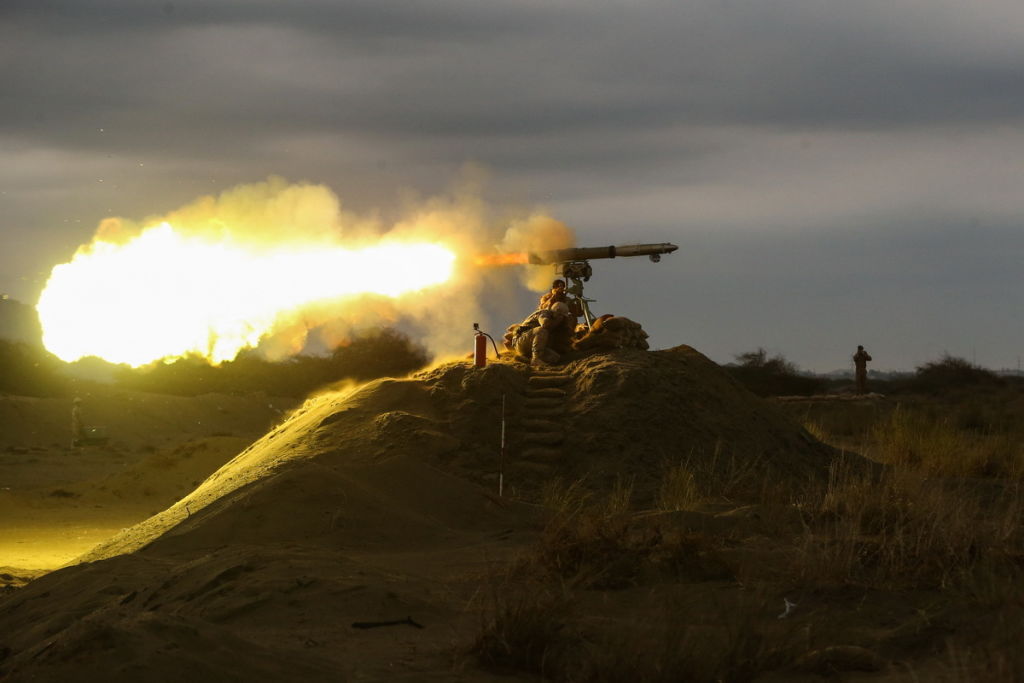Australia should harden its response to Iran’s hostility

The people responsible for Australia’s security are fully aware of the Iranian regime’s activities targeting Australians, at home and abroad.
An Iranian plot against a dissident living in Australia was foiled by the Australian Security Intelligence Organisation in 2022. Home Affairs Minister Clare O’Neil announced in February that late last year, ‘ASIO disrupted the activities of individuals who had conducted surveillance of the home of an Iranian Australian, as well as extensive research of this individual and their family.’ This followed evidence to a parliamentary inquiry in January that Iran was behind a series of cyberattacks on Australian entities in an attempt to steal data to be used for extortion.
ASIO Director General Mike Burgess referred to both plots while presenting the 2023 national threat assessment last month, although he didn’t mention Iran by name. Yet Burgess sounded a warning very relevant to the Iranian case, saying: ‘Australia is facing an unprecedented challenge from espionage and foreign interference and I’m not convinced we, as a nation, fully appreciate the damage it inflicts on Australia’s security, democracy, sovereignty, economy and social fabric.’
Tehran’s hostility is also manifested through the arbitrary arrests, based on fabricated evidence, of Australians who travel to Iran. This is part of the Iranian’s regime’s hostage-diplomacy strategy—detaining innocent foreigners to blackmail their governments.
Australian academic Kylie Moore-Gilbert was arrested in Iran in 2018 and jailed for 804 days in harsh conditions. The case against her was based on groundless accusations. She was freed in November 2020 in a deal that reportedly involved the release from prison of the two Iranians behind a 2012 Bangkok terror plot. This aggressive and indefensible activity against Australians continues. In November 2022, the media reported that an Iranian Australian dual national was jailed in Iran and denied all access to consular support. According to Moore-Gilbert’s testimony to a parliamentary inquiry, Iranian agents in Australia monitor movements and activities of Australians who criticise Tehran’s human rights record.
And these are just examples that have been made public.
The regime in Tehran has values that are aggressively at odds with Australian democracy. For almost two decades, Australia imposed international and autonomous sanctions on Iran.
Over the past few weeks, Australia has began to impose a new series of sanctions on Iran. On 1 February, Foreign Minister Penny Wong announced the application of additional sanctions on ‘Iranian individuals and entities over abhorrent abuses of human rights’ during the violent suppression of the widespread protests sparked by the death in custody of Mahsa Amini, who was imprisoned for wearing her headscarf improperly.
Australia now sanctions the regime’s Basij militia force and individuals in the Islamic Revolutionary Guard Corps. This is significant because the regime is increasingly indistinguishable from the IRGC. Notorious for being Iran’s primary mechanism of oppression of its people, and for spreading death and terror, the IRGC is directly under the control of the supreme leader, Ali Khamenei. Former IRGC members control the parliament and hold key government positions. The IRGC has become ‘the country’s most powerful military and economic entity’, and its budget has been constantly increasing. Responding to Australia’s sanctions, an Iranian foreign ministry spokesperson criticised Australia’s treatment of its First Nations people.
Iran is spearheading operations that undermine Australia’s security and the stability of its allies directly and in the Middle East. The IRGC’s elite Quds Force engages in subversion across the region and is arming, training, funding and ‘inspiring’ terrorist organisations in Lebanon, Yemen, Iraq, Syria, Bahrain and Gaza.
Iran has, for years, been engaged in international crime, money laundering, drug and weapons smuggling, and maritime piracy, including numerous attacks on oil tankers. It has, without provocation, bombed strategic energy facilities in neighbouring countries such as Saudi Arabia, and economic centres. Australian navy ships were sent to the Persian Gulf in 2019 to protect international waterways against Iranian aggression.
Tehran harbours international terrorists, open enemies of the West including of Australia, who make Iran their home and headquarters. The UN confirmed in February that the current leader of al-Qaeda, Saif al-Adel, resides in Iran, along with other senior members of the organisation.
Iran’s drive over decades to produce an indigenous nuclear weapons capability in violation of the Nuclear Non-Proliferation Treaty is possibly the biggest danger, challenging fundamentals of the rules-based international order which Australia holds dear. The 2015 nuclear deal is no longer a valid mechanism for stopping Iran. The director general of the International Atomic Energy Agency, Rafael Grossi, warned in January that Iran has enough fissile material for ‘several nuclear weapons’, and called the nuclear deal ‘an empty shell’. IAEA inspectors recently detected uranium in Iran illegally enriched to 84%, just 6 percentage points shy of military-grade uranium used in atomic bombs. The latest IAEA reports indicate that Iran is now a whisker away from a nuclear-weapons capability.
Finally, Iran’s ruling mullahs made a strategic decision to side with Russia in its war against Ukraine. Iran has been supplying Moscow with deadly drones used by Russian forces, including for actions believed to be war crimes. Iran is now building a plant inside Russia to supply more drones. The burgeoning military ties between the two countries mean Tehran has chosen yet again to stand with the aggressors and anti-Western powers that reject Australia’s key values, including its strong support for the victim of unprovoked aggression, Ukraine.
To protect Australians, Canberra should be in the forefront of the campaign to contain, limit and deter this rogue regime. Australia’s latest decision, on 20 March, to sanction dozens of Iranians involved in human rights violations and the supply of drones to Russia for use against Ukraine, is an encouraging sign.
The biggest step needed is for Australia to fully join in international efforts to stop Iran from achieving its dangerous nuclear dreams. This requires US leadership above all else, and Canberra should let Washington know that Australia is fully committed to any such effort.